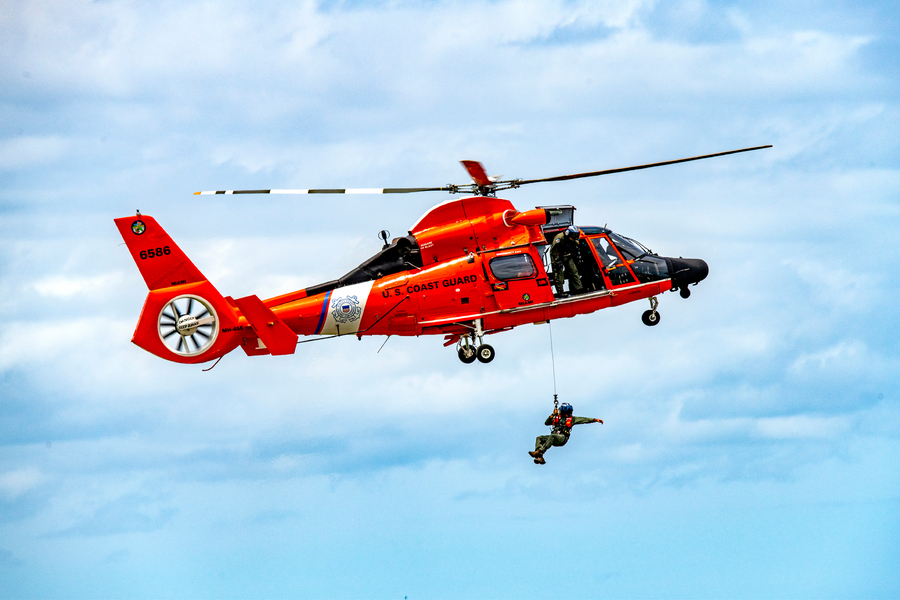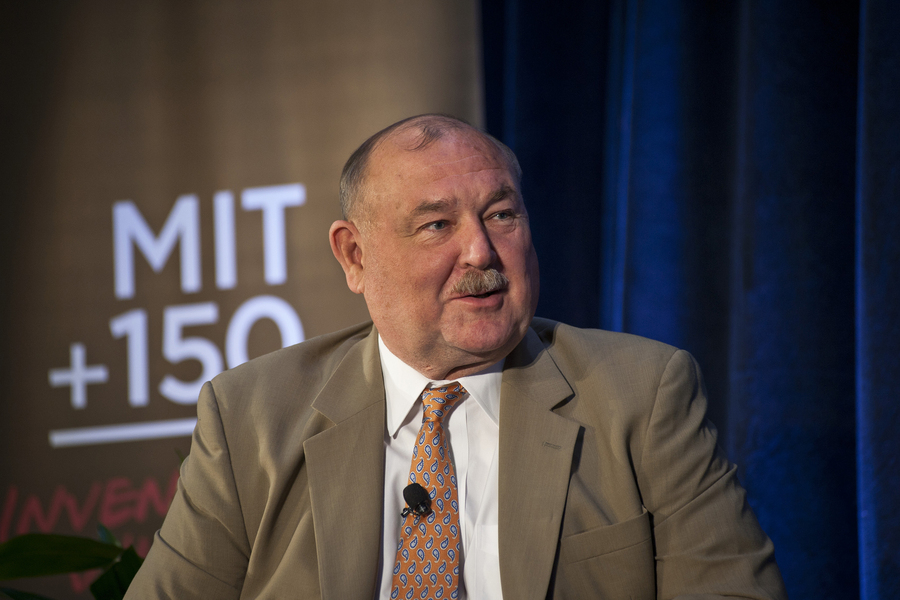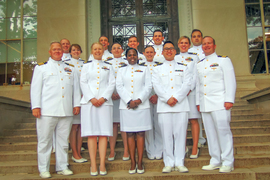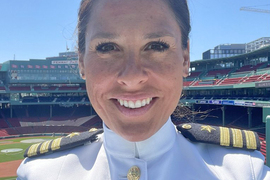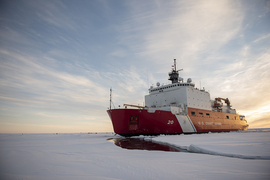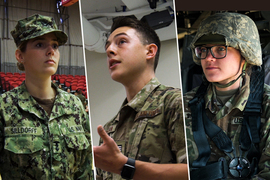Jim Ellis II SM ’80 first learned about a special opportunity for members of the U.S. Coast Guard while stationed in Alaska.
“My commander had received a notice from headquarters about this opportunity. They were asking for recommendations for an officer who might be interested,” says Ellis.
The opportunity in question was the MIT Sloan Fellows program, today known as the MIT Sloan Fellows MBA (SFMBA) program. Every year for 50 years, the Coast Guard has nominated a service member to apply to the program. Fifty Sloan Fellows and two Management of Technology participants have graduated since 1976, and the 53rd student is currently enrolled.
With his tour nearly over, Ellis followed his commander’s recommendation to apply. The Coast Guard nominated him and his application to MIT Sloan School of Management was accepted. In 1980, Ellis became the fifth-ever Coast Guard Sloan Fellow to graduate due to the special arrangement.
“My experience at MIT Sloan has been instrumental throughout my entire career,” says Ellis, who, with his wife Margaret Brady, designated half of their bequest to support graduate fellowships through the MIT Sloan Veterans Fund and half to establish the Ellis/Brady Family Fund to support the MIT Sloan Sustainability Initiative.
“The success of the people who have been through the program is a testament to why the Coast Guard continues the program,” he adds.
The desire to change the world
Throughout its 163-year history, MIT has maintained strong relationships with the U.S. military through programs like the MIT Reserve Officers' Training Corps, the 2N Graduate Program in Naval Architecture and Marine Engineering, and more.
The long-standing collaboration between MIT Sloan and the Coast Guard adds to this history. According to Johanna Hising DiFabio, assistant dean for executive degree programs at MIT Sloan, it demonstrates the Coast Guard’s dedication to leadership development, as well as the unique benefits MIT Sloan has to offer service members.
This is especially evident in the careers of the 52 Coast Guard Sloan Fellow alumni, many of whom the program often invites to speak to current students. “It is inspiring to hear our alumni reflect on how this education has significantly influenced their careers and the considerable impact they have had on the Coast Guard and the global community,” says DiFabio.
Captain Anne O’Connell MBA ’19 says, “It is very rewarding to be able to pay it back, to look for those officers coming up behind you who should absolutely be offered the same opportunities, and to help them chart that course. I think it's hugely important.”
One of the most notable Coast Guard Sloan Fellows is Retired Admiral Thad Allen SM ’89, who served as commandant of the Coast Guard from 2006 to 2010. One of the service’s youngest-ever flag officers, Allen is a figure beloved by current and former guardsmen. As commandant, he embraced new digital technologies, championed further arctic exploration, and solidified relations with the other armed services, federal partners, and private industry.
“When you leave MIT Sloan, you want to change the world,” says Allen.
Inspired by his father, who enlisted after the attack on Pearl Harbor, Allen attended the U.S. Coast Guard Academy and subsequently held various commands at sea and ashore during a career spanning four decades.
A few years before the end of his second decade, Allen learned about the Sloan Fellows Program through a service-wide solicitation. “The people I worked for believed this would be a great opportunity, and that it would match with my skill set,” says Allen. With the guidance of his senior captains, he applied to MIT Sloan.
Allen matriculated with a cohort whose members included Carly Fiorina SM ’89, former CEO of Hewlett-Packard; Daniel Hesse SM ’89, former CEO of Sprint; and Robert Malone SM ’89, former chair and president of BP America. Though he initially felt a sharp disconnect between his national service experience and their global private sector knowledge, Allen realized everyone in the cohort were becoming his peers.
Strong bonds with global perspectives
Like Allen, many of the Coast Guard Sloan Fellows acknowledge just how powerful their cohorts were when they matriculated, as well as how influential they have remained since.
“I have classmates with giant perspectives and unique expertise in places all over the world. It’s remarkable,” says Retired Commander Catherine Kang MBA ’06, who served as deputy of financial transformation for Allen.
The majority of SFMBA candidates come to Cambridge from around the world. For example, the 2023–24 cohort comprised 76 percent international citizens.
For Coast Guard Sloan Fellows with decades of domestic experience, their cohort’s global perspectives are as novel as they are informative. As Retired Captain Gregory Sanial SM ’07 explains, “We had students from 30 to 40 different countries, and I had the opportunity to learn a lot about different parts of the world and open up my mind to many different experiences.”
After the Coast Guard, Sanial pursued a doctoral degree in organizational leadership and a career in higher education that, professionally, has kept him stateside. Yet the bonds he built at MIT Sloan remain just as strong and as international as they were when he first arrived.
Many Coast Guard Sloan Fellows attribute this to the program’s focus on cooperation and social events.
“What impressed me most when I first got there were the team-building exercises, which made a difference in getting a group of diverse people to really gel and work together,” says Retired Captain Lisa Festa SM ’92, SM ’99. “MIT Sloan takes the time at the beginning to invest in you and to make sure you know the people you’re going through school with for the next year.”
The most recent Coast Guard Sloan Fellow alumnus, Commander Mark Ketchum MBA ’24, says his cohort’s connections are still fresh, but he believes they will last a lifetime. Considering the testimonies of his predecessors, this may very well be the case.
“My cohort made me stronger, and I would like to think that I imparted my strengths onto my classmates,” says Ketchum.
Big challenges with high impacts
Before earning the Coast Guard’s nomination and an acceptance letter from the SFMBA program, potential Sloan Fellows have already served in various leadership positions. Once they graduate, the recognition and distinction that comes with an MIT Sloan degree is quick.
So, too, are the more challenging leadership tracks.
After graduation, Allen served as deputy program manager for the Coast Guard’s shipbuilding program at the behest of the then-commandant. “For the agency head to say, ‘This is a bad problem, so I’m picking the next graduate from MIT Sloan,’ is indicative of the program’s cachet value,” he says. Allen then served in the office of budget and programs, a challenging and rewarding post that has become a hub for Coast Guard Sloan Fellows past, present, and future.
Like Rear Admiral Jason Tama MBA ’11 and Captain Brian Erickson MBA ’21, both of whom credit the office with introducing them to the vigorous work ethic necessary for both obtaining an MIT Sloan education and for becoming an effective leader.
“Never in a thousand years would I have gone on the resource management path until a mentor told me it would be one of the most challenging and high-impact things I could do,” says Tama. “You can never be fully prepared for the Sloan Fellows experience, but it can and will change you for the better. It changed the way I approach problems and challenges.”
“I owe MIT for the senior-level opportunities I’ve had in this organization, and I will probably owe them for some of the opportunities I may get in the future,” adds Erickson. “You should never, ever say no to this opportunity.”
From the early cohorts of Ellis, Allen, and Festa, to more recent alumni like O’Connell, Kang, and Ketchum, Coast Guard Sloan Fellows from the past half-century echo Erickson and Tama’s sentiments when asked about how MIT Sloan has changed them. Words like “challenge,” “opportunity,” and “impact” are used often and with purpose.
They believe joining the SFMBA program as up-and-coming senior leaders is an incredible opportunity for the individual and the Coast Guard, as well as the MIT community and the world at large.
“I am excited to see this tradition carry on,” says Tama. “I hope others who are considering it can see the potential and the value, not only for themselves, but for the Coast Guard as well.”
Participation by U.S. Coast Guard members in this highlight of prior MIT Sloan Fellows is not intended as, and does not constitute an endorsement of, the MIT Sloan Fellows MBA program or MIT by either the Department of Homeland Security or the U.S. Coast Guard.

